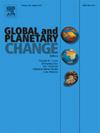Late Cretaceous ecosystem dynamics in the southern incipient Arctic Ocean: A micropaleontological and geochemical perspective
IF 4
1区 地球科学
Q1 GEOGRAPHY, PHYSICAL
引用次数: 0
Abstract
Micropaleontological and geochemical analyses in samples from the Coniacian-Maastrichtian-aged Smoking Hills and Mason River formations in the Anderson Basin of the northern mainland coast of Arctic Canada provide a refined picture of the environmental conditions occurring in the incipient southern Arctic Ocean at the end of the Cretaceous. These units were deposited within a 22 myr time span in an outer shelf setting characterized by relatively stable tectonic conditions and low sedimentation rates. The Coniacian-middle Campanian Smoking Hills Formation was deposited during times of marine transgression and water column stratification. Surface waters were highly productive and dominated by dinoflagellates, red algae, green algae and likely diatoms and silicoflagellates. Bottom waters were predominantly anoxic-euxinic, but the presence of benthic foraminifera and variations of geochemical signatures in some intervals indicate episodic ventilation. The deposition of the Smoking Hills Formation is temporally consistent with the Oceanic Anoxic Event 3 (OAE3), but the duration of these anoxic conditions is much longer in the Anderson Basin. During the middle Campanian, relative sea level reached a highstand, fostering the expansion of planktic siliceous microorganisms, including diatoms, silicoflagellates and radiolarians. During the late Campanian to at least the Maastrichtian, sediments of the Mason River Formation were deposited during a regressive sedimentation phase characterized by high productivity fueled by river run-off and the proliferation of diatoms, red and green algae. Despite high productivity, bottom waters were oxygenated. This study highlights the importance of data integration to reconstruct the environmental conditions of the past as many, if not all, of the proxies utilized to this end are subjected to preservational and diagenetic bias.
初生北冰洋南部的晚白垩世生态系统动力学:微古生物学和地球化学视角
对加拿大北冰洋北部大陆海岸安德森盆地科尼阿克纪-马斯特里赫特纪时期的吸烟山地层和梅森河地层样本进行的微古生物学和地球化学分析,提供了白垩纪末期北冰洋南部萌芽时期环境条件的精细图景。这些单元是在 22 百万年的时间跨度内沉积在外陆架环境中的,该环境的特点是构造条件相对稳定,沉积速率较低。康尼阿克纪--坎帕尼亚中期的烟丘地层沉积于海洋横断和水柱分层时期。表层水的生产力很高,主要是甲藻、红藻、绿藻,可能还有硅藻和硅鞭毛藻。底层水主要为缺氧-缺氧状态,但底栖有孔虫的存在和某些区间地球化学特征的变化表明存在偶发性通风。烟山地层的沉积在时间上与大洋缺氧事件 3(OAE3)一致,但在安德森盆地,这些缺氧条件的持续时间要长得多。在中元古代,相对海平面达到高位,促进了硅藻、硅鞭毛虫和放射虫等浮游硅质微生物的繁殖。在钟乳期晚期至至少马斯特里赫特期,梅森河地层的沉积物沉积在一个回归沉积阶段,其特点是河流径流和硅藻、红藻和绿藻的大量繁殖促进了高生产力。尽管生产力很高,但底层水含氧量很低。这项研究强调了数据整合对于重建过去环境条件的重要性,因为许多(如果不是全部)用于重建环境条件的代用指标都会受到保存和成岩偏差的影响。
本文章由计算机程序翻译,如有差异,请以英文原文为准。
求助全文
约1分钟内获得全文
求助全文
来源期刊

Global and Planetary Change
地学天文-地球科学综合
CiteScore
7.40
自引率
10.30%
发文量
226
审稿时长
63 days
期刊介绍:
The objective of the journal Global and Planetary Change is to provide a multi-disciplinary overview of the processes taking place in the Earth System and involved in planetary change over time. The journal focuses on records of the past and current state of the earth system, and future scenarios , and their link to global environmental change. Regional or process-oriented studies are welcome if they discuss global implications. Topics include, but are not limited to, changes in the dynamics and composition of the atmosphere, oceans and cryosphere, as well as climate change, sea level variation, observations/modelling of Earth processes from deep to (near-)surface and their coupling, global ecology, biogeography and the resilience/thresholds in ecosystems.
Key criteria for the consideration of manuscripts are (a) the relevance for the global scientific community and/or (b) the wider implications for global scale problems, preferably combined with (c) having a significance beyond a single discipline. A clear focus on key processes associated with planetary scale change is strongly encouraged.
Manuscripts can be submitted as either research contributions or as a review article. Every effort should be made towards the presentation of research outcomes in an understandable way for a broad readership.
 求助内容:
求助内容: 应助结果提醒方式:
应助结果提醒方式:


